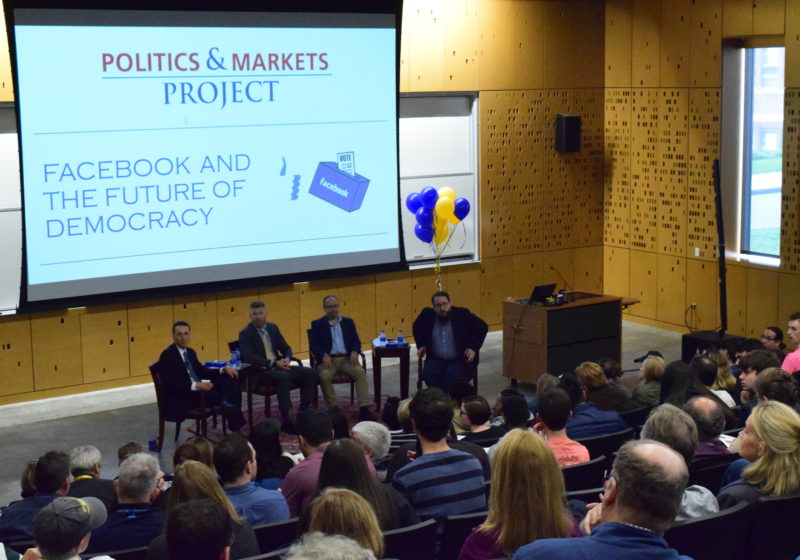On Oct. 5, the Politics and Markets Project hosted the “Facebook and the Future of Democracy” event as part of their initiative to encourage dialogue within the UR community about controversial topics.
David Primo, associate professor of political science and business administration at UR and organizer of the event, opened with welcoming remarks and introduced the three panelists: John Bockstanz, a Facebook employee, Adam Candeub, a Michigan State University law professor, and Paul Matzko, an Assistant Editor for Tech and Innovation at Libertarianism.org.
The event aimed to explore difficult questions — is Facebook a threat or a positive force to our democracy, and should the government have a role in regulating fairness on Facebook?
Bockstanz touched on Facebook’s community standards and explained its policy on removing content and or speech. “I know we aren’t perfect with the application of our rules,” he said. “There is certainly room to improve, but in terms of speech on Facebook, the rules that we have to remove content or remove accounts is related to behavior.”
Bockstanz also emphasized the importance Facebook places on keeping the platform safe and protecting people from possible danger. He made clear the scope of community standards in terms of protection and misinformation. Facebook does not consider itself to be the arbiter of truth, he said, but rather partners with third-party fact-checkers determine which content is considered false and should be removed or limited in its distribution.
During the conversation, Candeub and Matzko shared differing opinions on approaches to regulating Facebook and its various policies about regulating information and posts on the platform. Matzko’s thoughts leaned in favor of Facebook self-regulating instead of letting the government step in and regulate fairness on Facebook. His argument was centered around the ability of consumers to punish Facebook. “People are voting with their feet and leaving Facebook in the millions,” Matzko said. Meanwhile, Candeub suggested some level of government regulation is acceptable in order to have a free exchange of ideas and maximize differing views and opinions.
Towards the end of the discussion, an audience member asked a question regarding breaking up Facebook. Candeub did not definitively agree, but he was not opposed to the notion. Matzko disagreed with the idea of breaking up Facebook because reducing its size would decrease consumers’ access to free content. Bockstanz agreed with Matzko and reasoned that splitting up the company would divide resources and not allow for the same level of safety that Facebook currently provides.
The audience expressed mixed reactions, as some rolled their eyes while others nodded their heads.
“I found it fascinating about how much power Facebook has and how it can sway people’s opinions in one direction or another,” Alla Levi ‘79, said. She later added, “The speakers are wonderful. What I liked is that one spoke about a certain subject and how one picked it up. I liked the playful banter and the diverse opinions.”




